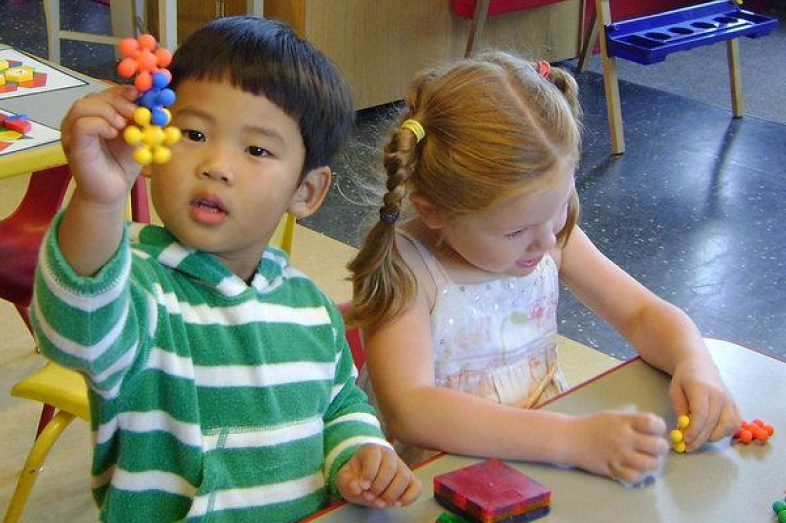When it comes making prekindergarten available to all children, the question for policymakers is not whether it’s a good idea or not. The issue is whether it’s possible to make high-quality pre-K universal, and what makes pre-K effective in the first place.
That was the main message from experts who spoke earlier this month at the Education Writers Association’s national seminar in Boston.
Cities and state legislators across the country have rushed to expand access to pre-K in response to a growing body of research showing that it can make a difference. Meanwhile, Democratic presidential candidate Hillary Clinton early in her campaign rolled out a plan for universal preschool.
The panelists agreed that prekindergarten can benefit children, but cautioned that there’s a lot of grey area regarding what factors pre-K programs must have to fulfill their true promise.
“There are high expectations, almost magical thinking, about what one year of pre-K will do,” said panelist Mark Lipsey, a researcher at Vanderbilt University’s Peabody College of Education. Lipsey and his co-researcher Dale Farran shocked the education community last fall when they posted results of a study showing that students who attended Tennessee’s public pre-K program benefitted significantly at first. But by third grade, they were actually performing worse than their low-income peers who did not attend pre-K. It was the first large-scale controlled study of prekindergarten, and called into question the very idea on which pre-K advocacy is predicated: that it’s worth the investment.
Lipsey and Farran have both been adamant that their study should not be used to scrap pre-K programs. They theorize that the problem in Tennessee — and likely elsewhere in the country — was that many of the public pre-K classrooms were not much more than free babysitting. This spring, the researchers worked with lawmakers in Tennessee to ensure that the state’s pre-K program emphasizes quality through professional development and collaboration with elementary schools..
Still, it’s not yet clear what other factors legislators should be looking to replicate across entire states. Panelist Scott Moore, the executive director of Kidango, an organization that provides pre-K and early childhood services throughout the Bay Area in California, said even he wasn’t sure what factors make a difference.
“The first thing we know about quality is that we don’t really know a lot about quality factors that lead to improved child outcomes,” he said.
Many of the factors that do likely lead to improved outcomes are not purely academic in nature, argued panelist C. Cybele Raver, a researcher at New York University’s Steinhardt School of Culture, Education and Human Development.
Raver works with and studies public preschools in New York City, and she’s found that strengthening students’ attention, working memory, and self-control seems to mitigate the impact of poverty down the road, which could shrink the country’s rapidly expanding achievement gap.
“We know that poverty can essentially get ‘under the skin’ in terms of disrupting attention and inhibitory control,” she said. “The next pressing question is not whether poverty is bad for kids…but what we can do to mitigate its effects.”
Even after researchers figure out factors worth spreading to other pre-K programs, it’s hard to get programs across a city or state to implement them properly.
“Changing kids’ behavior is easy compared to changing adults’ behavior,” Lipsey said regarding the challenges of scaling up.
Taking quality pre-K to scale isn’t the only challenge advocates and policymakers face. It’s also what happens after pre-K – something Lipsey and Raver are looking into.
Raver said that while she believes the interventions she’s helped implement in New York around social skills have made a difference, it might not be enough to save kids from the myriad of challenges they face after they leave the pre-K classroom.
“Is it fair to expect that my intervention serve as some kind of inoculation against all the challenges kids face?” she asked. “We don’t ask second grade to inoculate against everything that occurs before fifth grade. Why are we placing that onus on pre-K?”
She cited a study of Chicago pre-K students who entered kindergarten at the height of a budget crisis. Their classrooms were overcrowded, and their teachers overworked. That presented a whole new set of challenges that could not be overcome with specialized training for kindergarten teachers, or through earlier interventions in pre-kindergarten aimed at at curtailing bad behavior — like fighting with other students or frequently ignoring directions.
“From a kid’s perspective, (a crowded classroom) is a huge new self-regulation challenge,” Raver said. “And teachers may have been trained in early literacy, but not how to manage 28 kids in a classroom without air-conditioning.”
